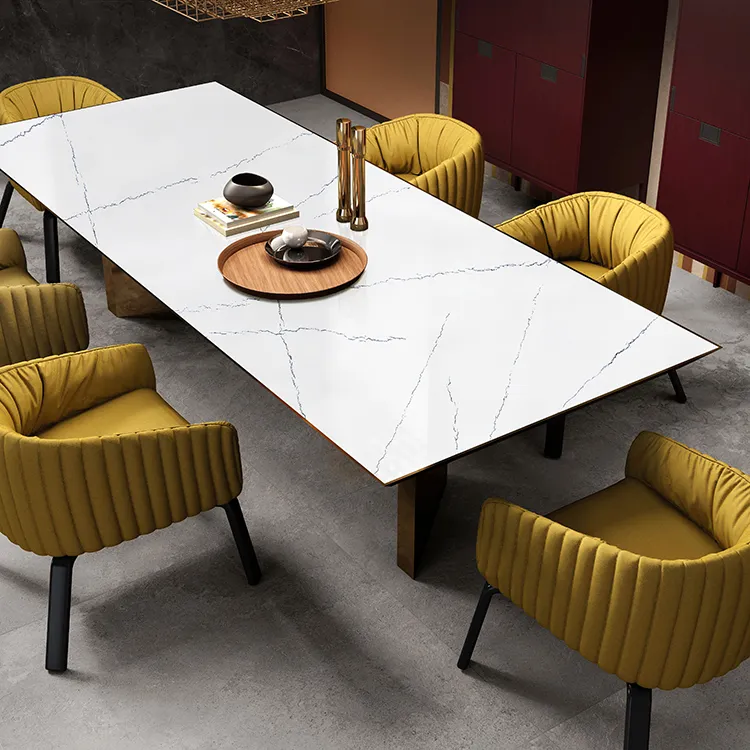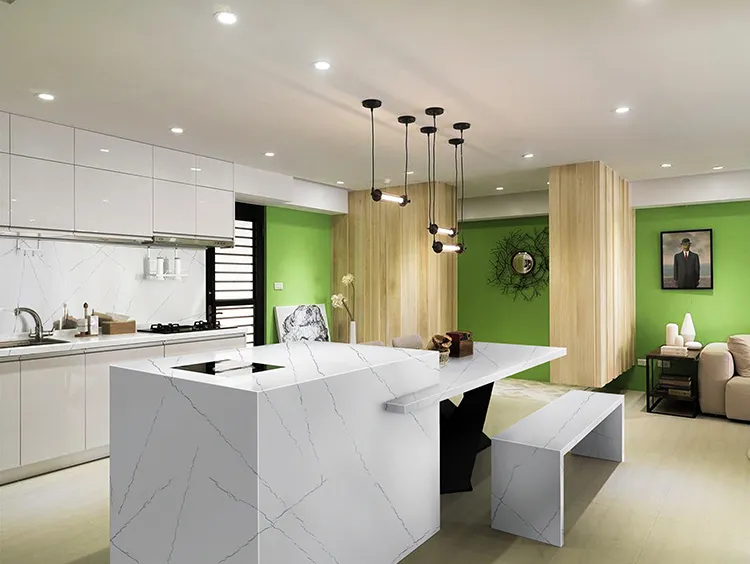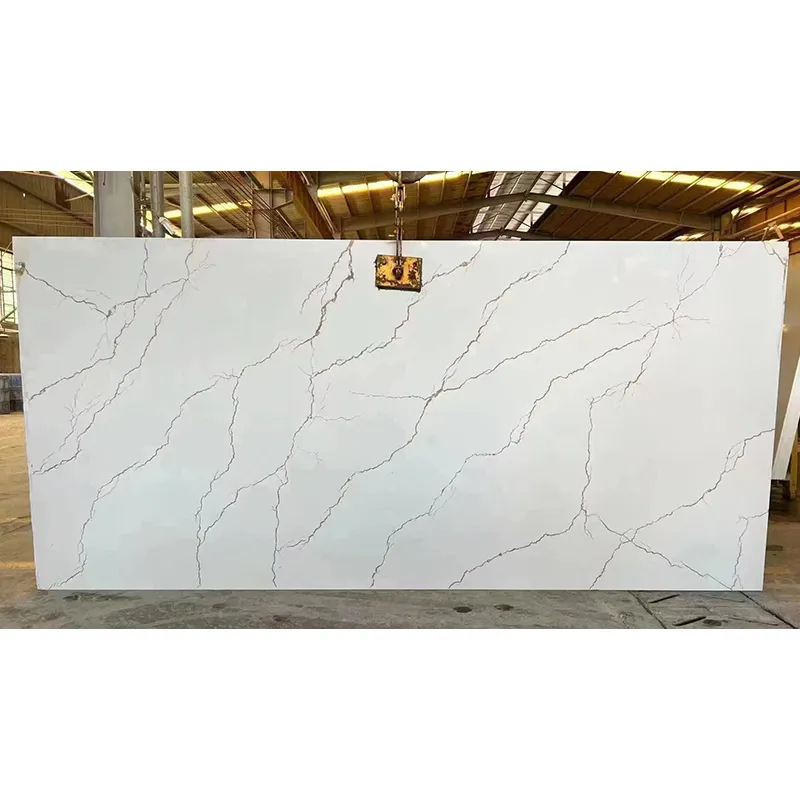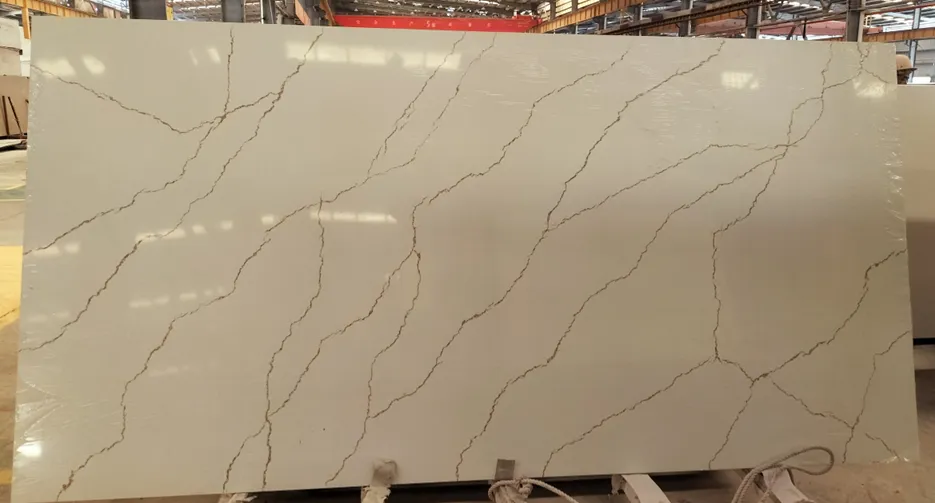Quartz stone countertops have become one of the most popular countertop materials in modern kitchens and bathrooms due to their high hardness, low water absorption, good stain resistance and excellent durability. However, during daily use, some users may find water stains or water rings left on the countertop surface, which raises concerns: Will water leave permanent marks on quartz stone countertops? This question involves many factors such as the physical properties of quartz stone benchtops, usage and maintenance methods, chemical composition of water and countertop surface treatment processes, and must be systematically explored.
This article will deeply analyze the material properties of quartz stone benchtops, the mechanism of water's impact on the countertop surface, the real cause of marks, and methods to avoid and remove water stains from multiple angles, answering the question of "Will water leave permanent marks on quartz stone countertops" in an all-round way.

Basic composition and performance characteristics of quartz stone benchtops
First of all, to determine whether water will leave permanent marks on quartz stone benchtops, you must first understand the basic composition and performance of quartz stone countertops.
1.1 Material composition
Quartz stone countertops are usually made of more than 90% natural quartz sand (SiO₂) mixed with a small amount of polymer resin, pigment and functional additives, and are made through a high-temperature and high-pressure vacuum process. This composite material has the following characteristics:
· High hardness: Mohs hardness is between 6.5-7, and it is not easy to be scratched by knives;
· Low water absorption: The water absorption rate is usually less than 0.03%, which is much better than natural marble, granite and other materials;
· Corrosion resistance: It has good resistance to general acid and alkali substances;
· Not easy to penetrate: The surface is dense and smooth, and it is not easy to absorb liquid;
· Easy to clean: Most stains can be wiped clean with clean water or neutral detergent.
It is precisely because of these advantages that quartz stone benchtops are widely used in environments with high frequency contact with water and liquids such as kitchens, toilets and commercial spaces.

What is the effect of water on quartz stone countertops?
To analyze whether water can leave a "permanent mark" on a quartz stone countertop, it is necessary to distinguish several different situations:
2.1 Will normal temperature water leave marks?
The answer is: usually no permanent marks are left.
The quartz stone countertop itself hardly absorbs water, and its surface structure is dense. Liquid water will exist in the form of water droplets on the surface, and will not penetrate or remain. Daily splashing of clean water will not leave any obvious marks after natural evaporation or wiping.
2.2 What if it is hard water or mineral water?
This is where attention needs to be paid. Hard water (such as water containing calcium and magnesium ions) may leave white or gray water stains after evaporation on the surface of the quartz stone benchtop. This is because after the water evaporates, minerals remain on the surface to form scale deposits.
Although these marks are not permanent, if they are not cleaned for a long time and repeatedly deposited, they may form a mineral crystal layer that is difficult to remove, giving the illusion of "permanent marks" visually.
2.3 The impact of high-temperature water on the countertop
Although the quartz stone countertop is resistant to high temperatures, its surface uses a composite material containing resin. If hot water (such as 100°C boiling water) is repeatedly poured on the same location, or the bottom of a boiling kettle is directly in contact with the countertop for a long time, it may cause slight discoloration of the local resin or heat marks.
This discoloration is rare, but it is possible to leave a color difference on the countertop. Therefore, it is necessary to use the quartz stone benchtop correctly and avoid improper high temperature behavior.

Do "water marks" really come from water? Revealing the real cause of the marks
In most cases, the "water marks on the quartz stone countertop" mentioned by users are not pure water marks, but are caused by the following factors:
3.1 Mineral deposits in water
As mentioned above, calcium and magnesium ions in hard water will form white deposits after evaporation. These deposits will become more and more obvious as they exist for a long time and are repeatedly superimposed, thus looking like "permanent marks".
3.2 Cleaner residue
Many users wipe the quartz stone benchtop with alkaline or acidic cleaners (such as 84 disinfectant, oil stain cleaner, bleach, etc.), but fail to rinse thoroughly with clean water. The residual chemical components form spots or white mist after drying, which may be mistaken for water stains.
3.3 Grease or scale mixture deposition
In the kitchen environment, there is often a mixture of oil smoke, water vapor, and grease. These substances are mixed to form "adhesive spots" when the water droplets on the countertop are not wiped dry, especially around the faucet and near the stove.
3.4 Surface micro scratches gather pollutants
Although the quartz stone countertop has high hardness, if the surface is slightly scratched by metal objects, scratches that are difficult to detect with the naked eye will be formed. These scratches are prone to accumulate scale and detergent residues, and eventually form "stains" that are difficult to remove.
How to prevent and remove water marks on quartz stone benchtops
To prevent water marks or "permanent marks" that are mistaken for quartz stone benchtops, you can strengthen daily use and maintenance from the following aspects:
4.1 Wipe water marks on the countertops in time
· After each use of water, wipe the countertops with a clean and soft towel or kitchen paper;
· Pay special attention to the "water-prone" locations such as the base of the faucet and the edge of the wash basin.
4.2 Clean regularly
· Use warm water + neutral detergent (such as dishwashing liquid) to clean the quartz stone benchtop to prevent scale accumulation;
· For families in hard water areas, you can regularly use a diluted white vinegar solution (1:10 ratio) to neutralize alkaline deposits.
4.3 Avoid using acidic and alkaline cleaners
· Strong acids or strong alkalis will corrode the surface resin of the quartz stone benchtop, causing discoloration or mottled spots. It is recommended to use neutral cleaning products, such as multi-purpose kitchen cleaning foam or non-corrosive spray.
4.4 For existing minor water stains:
·Spray white vinegar solution on the spot area, let it stand for 5 minutes, and wipe it with a soft cloth;
·For stubborn scale, use special stone cleaner or soft-bristled toothbrush to assist in treatment;
·Avoid using hard objects such as steel wool and sandpaper to scratch, so as not to damage the surface coating.
The anti-seepage treatment of quartz stone countertops and the difference between matte and glossy surfaces
5.1 Surface coating and protective agent
Some brands will apply nano-coating to quartz stone countertops before leaving the factory to enhance the anti-seepage and oil-resistant properties. These countertops are not easy to leave water marks during use, and even hard water deposits can be easily wiped off.
If the effect weakens after long-term use, consumers can choose "quartz stone protective agent" on the market for regular surface protection treatment.
5.2 The difference between matte and glossy surfaces
·Glossy surface: smooth and dense, water droplets are not easy to adhere to, and it is easy to clean;
·Matte surface: The surface has a stronger sense of friction, which is easier to "absorb" water stains and oil stains, and needs to be cleaned more frequently.
Therefore, matte quartz stone benchtops are more likely to show "water marks" visually, but they are not real penetration or permanent pollution.

Will water leave permanent marks on quartz stone benchtops?
Through the above systematic analysis, we can draw the following professional conclusions:
1. Pure water will not leave permanent marks on quartz stone countertops;
2. Water marks are mostly caused by minerals in the water, detergent residues or surface stains accumulation;
3. "Permanent marks" are mostly visual misjudgments and can be removed in an appropriate manner;
4. Proper use, protection and cleaning can completely avoid such problems.
Therefore, quartz stone benchtops, as a high-performance, high-density, low-water absorption material, are very suitable for countertop materials that are in daily contact with water environments. Users do not have to doubt its performance due to "water stains", but should pay attention to the correct use and maintenance methods to extend the life of the countertop and maintain the best appearance.
Rongguan’s expertise in manufacturing quartz stone benchtop, terrazzo flooring, and artificial marble has made us a preferred supplier for contractors and architects worldwide. Our Foshan-based factory, equipped with state-of-the-art production lines, ensures that every product meets the highest standards of quality and design. With clients across the Middle East, Europe, and Southeast Asia, we provide cost-effective solutions, including factory-direct pricing, bulk discounts, and promotional offers. Partner with Rongguan today to source materials that enhance your projects' value and appeal.

